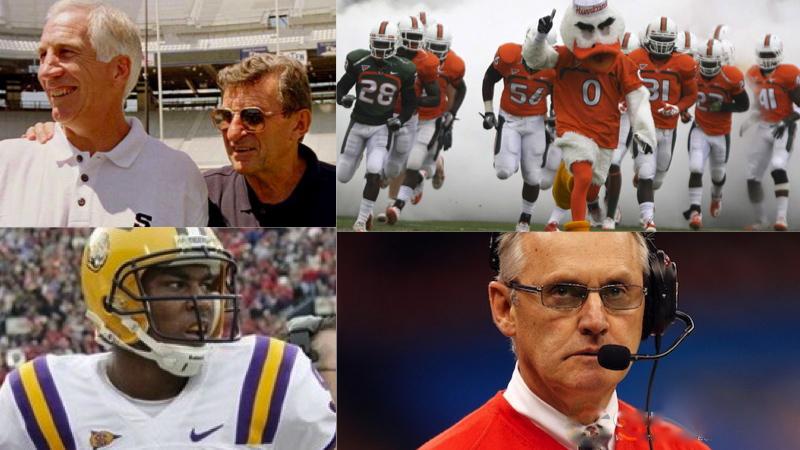Scandals may one day ruin college football as I, and millions of other fans around the world, get fired up about it yet, as much as any one of us would like to do something about it—we can do nothing. All we can do is sit and watch as athletic programs are being chewed up and spat out all because of bad decision-making.
In 2011, six college football teams faced major recruiting violations, criminal violations, or other types of violations. Out of this came four major stories that all happened this year and I’m going to start with the most recent one. The Penn State story.
Penn State head coach Joe Paterno and former assistant coach Jerry Sandusky coached together at Penn State for 33 years until Sandusky retired in 1999 (Paterno stayed on as head coach of Penn State up until his 46th year there). The relationship between these two was excellent. They won 2 national championships together and Joe Paterno is going to go down as one of the greatest head football coaches of all time. But, due to a disturbing decision by Sandusky, Paterno decided it was time to retire.
According to an ESPN.com report. A grand jury identified eight boys who were sexually assaulted by Sandusky from 1994 through 2009. At least 20 incidents allegedly took place while Sandusky was still employed at Penn State. According to an indictment, in 2002 assistant coach Mike McQueary walked in on Sandusky sexually assaulting a ten-year-old boy. McQueary reported the incident to Paterno who then told Penn State athletic director Tim Curley who then the reported it to Penn State President Graham Spanier. The incident was never reported elsewhere. The indictment from November 2011 accused Curley and Vice President of Finance and Business Gary Shultz of not only of failing to tell the police, but also of falsely telling the grand jury that McQueary never informed them of the sexual activity. On November 5, Sandusky was convicted of seven counts of child molestation, eight counts of corruption of minors, eight counts of endangering the welfare of a child, seven counts of indecent assault, and other offenses. One day later Curley and Shultz have resigned, McQueary’s and Spanier’s jobs are on the line, and Joe Paterno was fired on November 9 after serving at Penn State for a total of 61 years.
The failure to report a crime is really what gets the law and NCAA investigators going. In another incident in late December of 2010, the NCAA found multiple infractions wherein Ohio State football players were selling memorabilia and awards for improper benefits. Ohio State head football coach Jim Tressel knew about all these improper benefits and failed to report any of them. On May 30, 2011, Tressel was fired and five Ohio State players were suspended for the first five games of next year. One month later, the NCAA forced Ohio State to vacate all 12 wins from the 2010-11 season, including the Sugar Bowl win against Arkansas. Ohio State then was handed a two-year probation on its football program.
The cover-up almost always worsens the crime.
In late-August 2011, the LSU Tigers suspended star quarterback Jordan Jefferson and one other teammate after they got in a bar fight. The two were charged with second-degree assault with a battery and were suspended for the first couple games of the season.
The final story comes from the University of Miami. From 2002 to 2010, Hurricane athletic booster Nevin Shapiro provided large-scale improper benefits to Miami players. Shapiro is currently in jail for holding a $930 million dollar Ponzi scheme. Thus far, 72 athletes from Miami allegedly received improper benefits from Shapiro and, if this holds true, the NCAA may come down with “the death penalty” for Miami, which means a ban for that school to compete in ANY athletic event for one or more years.
To decrease the affect of these benefit scandals, people are suggesting that colleges and universities should pay their student athletes. This however, will cause an extreme amount of inequality and unfairness. Others are suggesting that Congress should run college sports and not the NCAA. They believe this would help with all the legal issues and punishments.
The affect these stories have on college football is immense. It’s changing the way people watch and follow college sports, it’s changing the way coaches recruit student athletes, and it makes storied and masterful athletic programs look like complete messes.
The horrible thing about these allegations is that there are just a couple of people who are making bad decisions that bring a whole program down. Trust me, we’re not done with these allegations. Many more are set to come down in the near future to ruin athletic programs and affect college sports forever.







